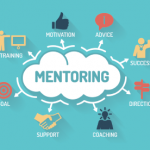 High-quality mentoring is perhaps the most recognized ingredient to a successful career, one that remains little understood. Here, we present a brief overview of the elements of successful mentor-mentee relationships for clinicians and scientists in rheumatology. We discuss the importance of mentorship and characteristics of good mentoring, and offer our personal reflections as both mentees and mentors.
High-quality mentoring is perhaps the most recognized ingredient to a successful career, one that remains little understood. Here, we present a brief overview of the elements of successful mentor-mentee relationships for clinicians and scientists in rheumatology. We discuss the importance of mentorship and characteristics of good mentoring, and offer our personal reflections as both mentees and mentors.
What Exactly Is a Mentor?
Mentor does not have a standardized definition. The term comes from Greek mythology. In Homer’s Odyssey, Mentor was a character in charge of Odysseus’ son Telemachus.1 However, Athena, Telemachus’ mother, disguised herself as Mentor, encouraging Telemachus to go abroad and giving him advice on how to deal with personal dilemmas.
Over time, the word mentor has come to mean someone who shares knowledge and gives wisdom to someone less experienced. Today, the term mentorship describes a two-way relationship in which one individual invests personal knowledge, energy and time to help another grow and develop to become the best and most successful they can be.2
Why Is Mentoring Important?
Successful mentorship fulfills several important roles. It serves as a critical bridge between didactic classroom instruction and the mastery of skills necessary to be an effective clinician and/or productive scientist. Without mentorship, the translation of high-level skills, along with the discernment to know when to apply such skills, can be lost.
Mentoring offers an opportunity to acquire tacit knowledge—unwritten information conveyed through interactions with colleagues, students and patients. Tacit knowledge allows us to view tasks and activities from multiple perspectives, work adroitly within complex health systems and communicate effectively within interprofessional teams.
Mentoring offers an opportunity to acquire tacit knowledge—unwritten information conveyed through interactions with colleagues, students & patients.
The personal growth and development that result from mentoring lead to increased academic productivity (e.g., papers and grants, career guidance and satisfaction) and the ability to network more effectively. Successful mentors encourage independent thinking and nurture the confidence mentees need to adopt new interests and methods that can propel them in new directions.
Opportunities
The most common model of mentorship is largely informal, in which mentees approach individuals they respect and trust to seek career guidance. Meetings may occur on an infrequent basis, and goals and outcomes of the informal mentor-mentee relationship are not formalized.
Informal mentorship is very common in medicine; for example, in 2016 only 50% of surgical departments in the U.S. reported offering formal mentorship programs.3 In rheumatology practice and research, most mentoring still occurs on an informal basis. This type of mentorship has inherent drawbacks, and the ultimate success of such partnerships has received little evaluation.



